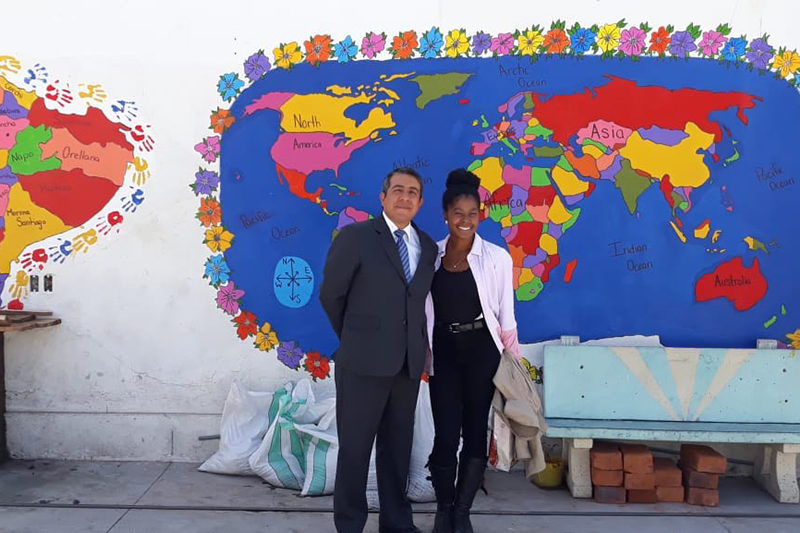The fellowships are awarded to Returned Peace Corps Volunteers.
The Jackson Institute has named two graduate students as 2019-2020 Coverdell Fellows. The fellowships are awarded to Returned Peace Corps Volunteers.
During their graduate studies, Coverdell Fellows complete a degree-related internship in an underserved American community, allowing them to bring home and expand upon the skills they learned as Peace Corps volunteers. At Jackson, Coverdell Fellows receive full tuition.
 Liam Comer-Weaver MA ’21 spent two years serving as a Teaching English, Leadership, and Life Skills volunteer in western Panama’s indigenous reservation, comarca Ngäbe-Buglé. There, he worked with teachers and university students to improve English-teaching methodology within his community of service. He also partnered with Panama’s Ministry of Health and the NGO Hands for Global Health to expand access to HIV treatment and other medical care on the Ngäbe-Buglé reservation.
Liam Comer-Weaver MA ’21 spent two years serving as a Teaching English, Leadership, and Life Skills volunteer in western Panama’s indigenous reservation, comarca Ngäbe-Buglé. There, he worked with teachers and university students to improve English-teaching methodology within his community of service. He also partnered with Panama’s Ministry of Health and the NGO Hands for Global Health to expand access to HIV treatment and other medical care on the Ngäbe-Buglé reservation.
Comer-Weaver—whose parents met in the Peace Corps—requested a placement in a remote indigenous community. He worked diligently to learn the local Ngäbe language, which was critical to becoming an integrated member of the community, Comer-Weaver said.
While in Panama, Comer-Weaver says he saw how policies can perpetuate inequality; he believes on-the-ground experience is crucial for policymakers. He is still exploring his own career path, but tackling inequality is a topic he’s passionate about.
When he was researching graduate school programs, Jackson stood out for the flexibility of its curriculum, said Comer-Weaver, who is taking courses in law, public health and management. The interdisciplinary nature of the program is helping him “understand where to go from here,” he said.
 Jackson classmate Deanna Johnson MA ’21 served for two years in Latacunga, Ecuador as an English Education Volunteer, where she worked alongside Ecuadorian English teachers at public schools to improve their methodologies and increase teaching efficacy in the classroom. Johnson also worked to promote leadership, health, and gender equity amongst teens by collaborating with other volunteers to plan and institute Ecuador’s first-ever national project following the Peace Corps’ Girls Leading Our World (GLOW) and Boys Respecting Others (BRO) initiatives.
Jackson classmate Deanna Johnson MA ’21 served for two years in Latacunga, Ecuador as an English Education Volunteer, where she worked alongside Ecuadorian English teachers at public schools to improve their methodologies and increase teaching efficacy in the classroom. Johnson also worked to promote leadership, health, and gender equity amongst teens by collaborating with other volunteers to plan and institute Ecuador’s first-ever national project following the Peace Corps’ Girls Leading Our World (GLOW) and Boys Respecting Others (BRO) initiatives.
While Johnson was in Ecuador, the country experienced an influx of Venezuelan migrants. Seeing how that impacted her community furthered Johnson’s interest in migration policy and human rights, which is part of her focus area for her Jackson studies. Johnson’s service also helped her develop personal traits that have helped her navigate graduate school: flexibility, resilience and optimism.
Johnson says her time in the Peace Corps was rewarding both personally and professionally. Living with a host family “allowed me to really integrate into the community,” she said. Her service was also important groundwork for her future professional ambitions. “I knew I wanted to work in development. I wanted grassroots experiences working with communities,” Johnson said.
Both Comer-Weaver and Johnson are interning with IRIS, a New Haven-based refugee resettlement agency, as part of their Coverdell Fellowship.
